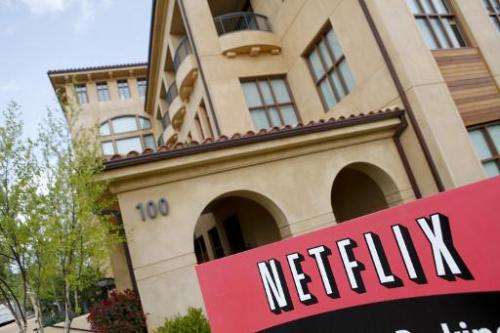Internet titans to protest 'fast lanes' Wednesday

Streaming television titan Netflix will be among websites displaying a dreaded spinning wheel icon on Wednesday to rally support for blocking Internet "fast lanes."
It's part of a massive "Internet Slowdown" protest—joined by dozens of top Internet firms and advocacy groups, including WordPress and the American Civil Liberties Union.
The spinning symbols—usually used to denote a slow-loading page—won't actually slow website performance, but they will link to battleforthenet.com/sept10th, where there are ways to take action to defend "net neutrality."
California-based Netflix posted the link Monday at its Twitter account, urging others to join the campaign.
"The free and open Internet has been central to the economy and to global free expression," said Paul Sieminski, general counsel of Automattic, a web development firm that runs blogging service WordPress.
"Everyone has to step up now and do everything they can to protect it," Sieminski said.
"We need our leaders to stand up to the cabal of cable and phone giants that have called the shots in Washington for too long," Free Press Action Fund president Craig Aaron said in a release.
More than 100 technology firms, including titans Microsoft, Google, Facebook, and Twitter, came out in May against suggested rules from the Federal Communications Commission (FCC) that seemingly run counter to the cherished ideal of "net neutrality."

Under the FCC rules, Internet service providers with virtual strangleholds on some US cities would be able to charge tolls for data to get priority in "fast lanes."
Such rules "would enable phone and cable Internet service providers to discriminate both technically and financially against Internet companies and to impose new tolls on them," Google, Amazon, Microsoft and other Internet firms said in a letter to the FCC.
"This represents a grave threat to the Internet."
The FCC has been adamant that it remains committed to net neutrality and is trying to create rules that can withstand legal scrutiny.
Two prior attempts, the most recent in 2010, by the FCC to hold broadband service providers to standards were stymied by US District Court decisions that such moves were outside the agency's scope of authority.
The FCC contends there is a "gap" in oversight of ISPs, because the court struck down its efforts to ban blocking or slowing of online data.
The US Congress could safeguard Net Neutrality with legislation.
Net neutrality advocates argue that letting Internet firms with deep pockets pay for faster data transmission will put innovative young startups at a disadvantage.
© 2014 AFP


















